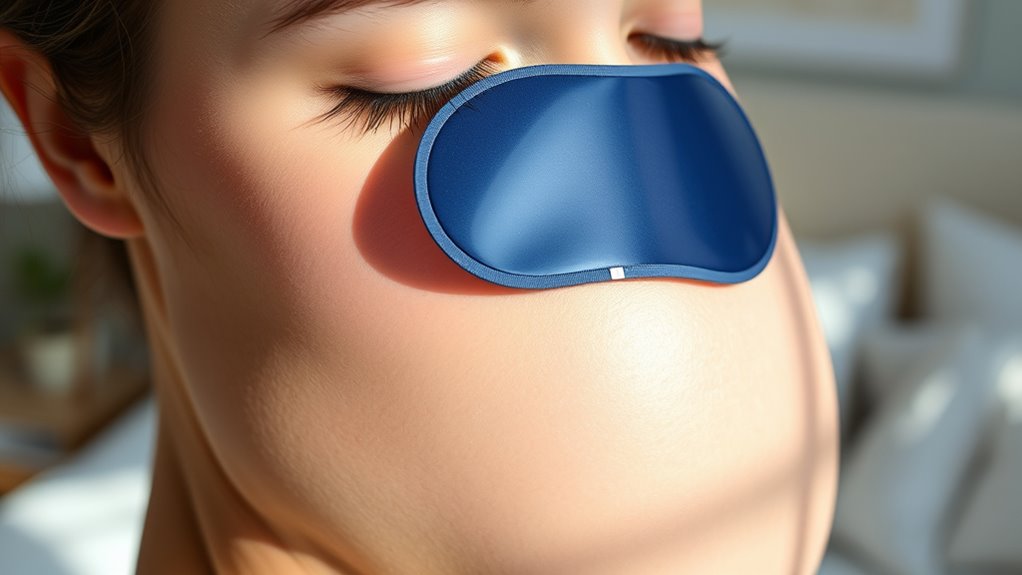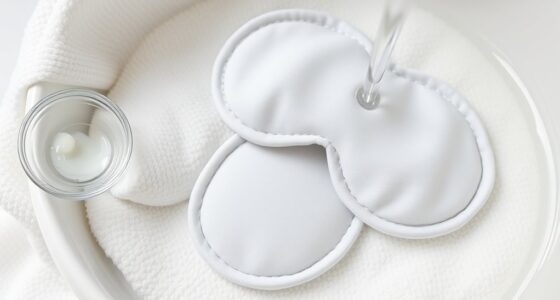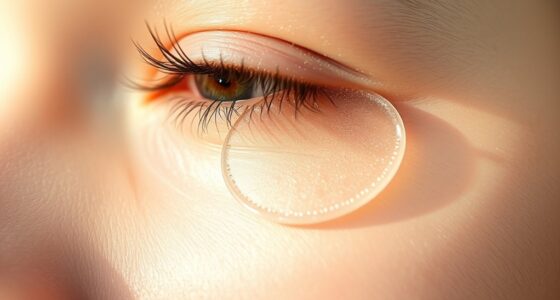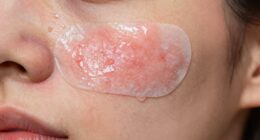During pregnancy, eye patches can be safe if they contain gentle, natural ingredients and minimal caffeine or herbs that could affect you or your baby. Check labels carefully for caffeine, strong herbs, fragrances, or preservatives, as these can cause sensitivities or hormone effects. Opt for products designed for pregnancy or with simple, soothing ingredients. If you want to make sure you’re choosing the safest options, consider what ingredients to watch for and what alternatives are available.
Key Takeaways
- Check for caffeine content; small amounts are usually safe, but avoid high doses during pregnancy.
- Review herbal ingredients for potential allergens or hormone-like effects; prefer gentle, natural extracts.
- Avoid eye patches with harsh chemicals, fragrances, or preservatives that could irritate sensitive skin.
- Consult with a healthcare provider before use, especially if the patch contains green tea or other caffeine sources.
- Opt for pregnancy-safe products specifically formulated for sensitive skin and pregnancy considerations.
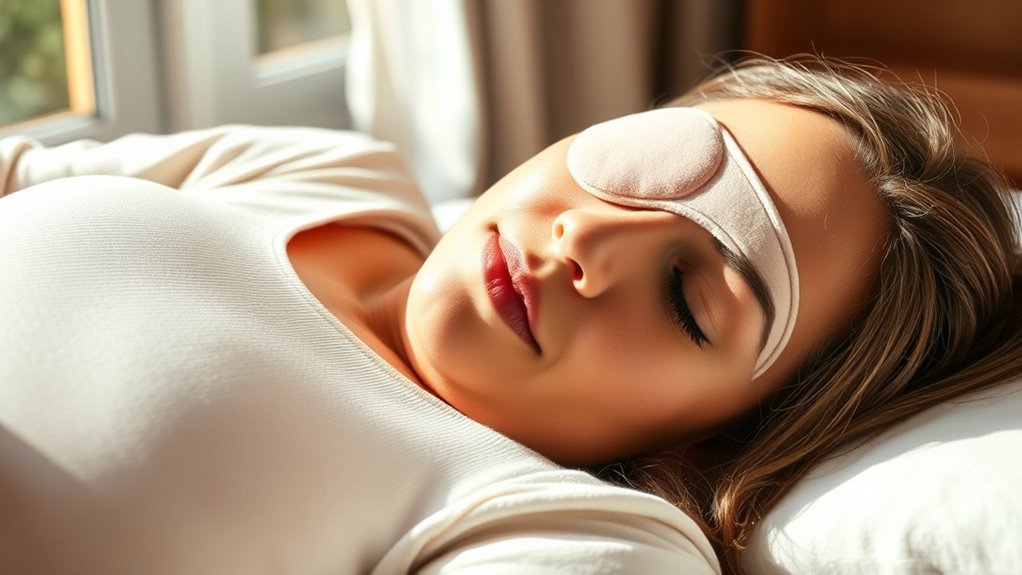
Eye patches during pregnancy have become a topic of curiosity for many women seeking natural remedies or comfort measures. You might wonder whether these soothing patches are safe to use while you’re expecting. One key factor to contemplate is their ingredients, especially the caffeine content and herbal ingredients, which can impact both your health and your baby’s development.
Many eye patches marketed for reducing puffiness, dark circles, or tired eyes contain caffeine. Caffeine acts as a vasoconstrictor, which means it constricts blood vessels and can temporarily reduce swelling or dark circles. However, if these patches are meant to be applied around the eyes and contain significant caffeine, you might absorb some amount into your skin. While small amounts rarely cause harm, during pregnancy, it’s best to be cautious. Excessive caffeine exposure has been linked to pregnancy complications, so limiting your overall caffeine intake is advisable. Check the label to see if the eye patches contain caffeine, and if so, consider whether the amount is minimal or if it might add to your daily caffeine limit.
Many caffeine-containing eye patches may contribute to your daily intake during pregnancy.
Herbal ingredients are another aspect to evaluate. Many eye patches include herbal extracts such as chamomile, cucumber, aloe vera, or green tea. These ingredients are often chosen for their soothing, anti-inflammatory, and hydrating properties. Generally, herbal ingredients are considered safe during pregnancy, especially when applied topically and in small quantities. However, some herbs can have unintended effects or cause allergic reactions, so it’s important to review each ingredient carefully. For instance, green tea contains antioxidants but also has caffeine, so it’s essential to know the concentration. Some herbal extracts might have hormone-like effects or cause skin sensitivities, which could be problematic during pregnancy.
Additionally, the contrast ratio of the ingredients used in eye patches can influence their effectiveness and safety. Before using any eye patch, you should scrutinize the ingredient list thoroughly. Opt for products with natural, minimal ingredients and avoid those with harsh chemicals, added fragrances, or preservatives. If you’re unsure about a particular herbal ingredient, consult your healthcare provider. They can help you determine whether that ingredient is safe during pregnancy.
Ultimately, the safety of eye patches during pregnancy depends on their ingredients and your individual health profile. While some herbal ingredients are generally safe, the presence of caffeine or other active compounds warrants caution. Always read labels carefully, and when in doubt, choose products specifically formulated for pregnant women or seek advice from your doctor. Your goal should be to find comfort and relief without risking your health or your baby’s well-being.
Frequently Asked Questions
Can Eye Patches Affect Fetal Development During Pregnancy?
Eye patch ingredients can potentially influence fetal development if they contain harmful chemicals. When considering fetal safety, you should check ingredient lists carefully, avoiding patches with strong or unknown chemicals. While some ingredients may be safe, others could be absorbed into your bloodstream and impact your baby. Always consult your healthcare provider before using eye patches during pregnancy to ensure they won’t compromise fetal safety.
Are Natural or Homemade Eye Patches Safer for Pregnant Women?
Think of natural or homemade eye patches as gentle whispers from nature, offering a soothing touch without harsh chemicals. During pregnancy, these DIY treatments can be safer, but you still need to check ingredients carefully. Stick to simple home remedies like cucumber slices or chilled tea bags, and avoid anything with strong preservatives or unfamiliar herbs. Always consult your healthcare provider before trying new remedies to keep both you and your baby safe.
Do Eye Patches Interact With Pregnancy-Related Skincare Treatments?
You should be cautious about eye patches interacting with pregnancy-related skincare treatments, as some ingredients can cause adverse reactions. Always check for pregnancy-safe ingredients and avoid potential allergen risks like certain fragrances or preservatives. Combining eye patches with treatments containing active ingredients might lead to irritation or unwanted effects. To stay safe, consult your dermatologist or healthcare provider before using eye patches alongside your pregnancy skincare routine.
Is There a Recommended Duration for Wearing Eye Patches While Pregnant?
When considering patch wearing recommendations during pregnancy, it’s best to follow duration guidelines provided by the product. Typically, you should wear eye patches for about 15-20 minutes, but always check the specific instructions. Avoid overuse to prevent irritation or adverse reactions. If you’re unsure, consult your healthcare provider for personalized advice. Remember, moderation and proper timing help help guarantee safety and effectiveness during pregnancy.
Can Eye Patches Help With Pregnancy-Related Eye Conditions?
Like a gentle whisper, eye patches offer potential relief for pregnancy-related eye conditions. They can provide cosmetic benefits, such as reducing puffiness and dark circles, helping you feel more refreshed. However, be cautious of allergy risks, especially with unfamiliar ingredients. Always check the ingredient list and consult your healthcare provider before use, ensuring you don’t inadvertently introduce substances that could harm you or your baby.
Conclusion
In conclusion, while eye patches can seem tempting, it’s wise to be cautious during pregnancy. Always check the ingredients and consult your healthcare provider before use, for safety’s sake. Think of it as a modern-day Hippocrates’ advice—better to be safe than sorry. Protecting your health now ensures you and your little one enjoy a brighter, more comfortable future. Remember, even the smallest precautions can make a world of difference during these precious months.
